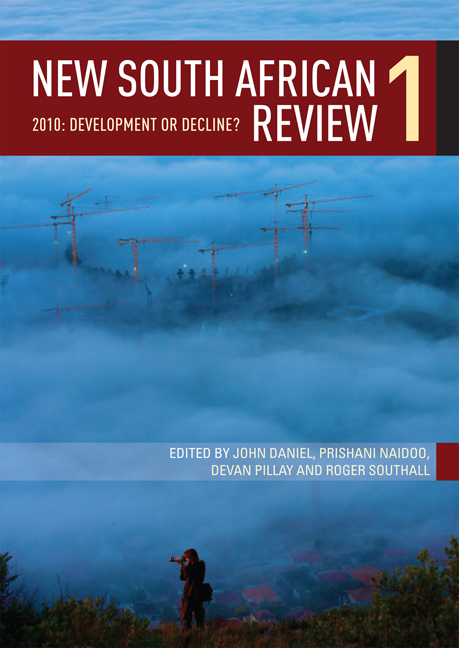Book contents
- Frontmatter
- Contents
- Preface
- Introduction South Africa 2010: From short-term success to long-term decline?
- PART 1 ECONOMY, ECOLOGY AND SUSTAINABILITY
- PART 2 STATE, POLITICS AND POLICY
- PART 3 EDUCATION, HEALTH AND LAND
- PART 4 Doreen Atkinson
- INTRODUCTION Signs of social decline? Crime, prisons, child trafficking and transactional sex
- CHAPTER 17 Our burden of pain: Murder and the major forms of violence in South Africa
- CHAPTER 18 Waiting for Godot: Awaiting trial detainees in South Africa
- CHAPTER 19 Wolves in sheep's skin: Trafficking of children in Musina, Limpopo Province
- CHAPTER 20 Relationships of exchange amongst South African youth in an age of conspicuous consumption
- Contributors
- Index
CHAPTER 20 - Relationships of exchange amongst South African youth in an age of conspicuous consumption
from PART 4 - Doreen Atkinson
Published online by Cambridge University Press: 21 April 2018
- Frontmatter
- Contents
- Preface
- Introduction South Africa 2010: From short-term success to long-term decline?
- PART 1 ECONOMY, ECOLOGY AND SUSTAINABILITY
- PART 2 STATE, POLITICS AND POLICY
- PART 3 EDUCATION, HEALTH AND LAND
- PART 4 Doreen Atkinson
- INTRODUCTION Signs of social decline? Crime, prisons, child trafficking and transactional sex
- CHAPTER 17 Our burden of pain: Murder and the major forms of violence in South Africa
- CHAPTER 18 Waiting for Godot: Awaiting trial detainees in South Africa
- CHAPTER 19 Wolves in sheep's skin: Trafficking of children in Musina, Limpopo Province
- CHAPTER 20 Relationships of exchange amongst South African youth in an age of conspicuous consumption
- Contributors
- Index
Summary
‘… but I need his help, or might need it later on – there is, after all, that invisible institution
called the Favour Bank, which I have always found so very useful.’
‘What is this Favour Bank?’
‘You know. Everyone knows.’
‘Possibly, but I still haven't quite grasped what you're saying.’
‘It was an American writer who first mentioned it. It's the most powerful bank in the world,
and you'll find it in every sphere of life.’
(Paulo Coelho, The Zahir, 2006)‘Selling sex’ is said to be the oldest profession in the world. However, starting in the 1990s, a new term, transactional sex (TS) emerged to describe particular forms of the exchange of sex by women for money and other necessities for survival. Distinctive to TS was that the interaction was not framed as a ‘sex for sale’ exchange and women who engaged in this process did not construct themselves as sex workers. In the early 2000s, however, researchers began to challenge assumptions that sexual exchange was merely an economic survival strategy (Hunter 2002, 2007; Leclerc-Madlala 2002, 2004; Selikow et al 2002; Thorpe 2002), hence the term transactional sex for conspicuous consumption (TSCC) emerged.
This term encompasses an exchange where women provide one ‘favour’, sex, in return for luxury gifts or services from a man. Unlike TS for survival, it does not involve the exchange of resources for subsistence needs but is driven primarily by the pressures of modernity and codes of consumer culture. Within this globalised culture TSCC is becoming more common-place in Africa and in South Africa (Hunter 2002, 2007; Kaufman and Stavrou 2002; Leclerc- Madlala 2004; Luke 2003). To understand the workings of day to day gift giving and sexual relationships, it is necessary to locate them within the context of consumerism, modernity and globalisation and other broader structures and processes. It is also important to note that not all gift giving is based on expectations of sex; indeed giving or receiving a gift does not necessarily imply any sexual transaction (Kaufman and Stavrou 2002), and the boundaries between gift giving for sex and other forms of gift giving are blurred.
Moreover, while we draw primarily on TSCC as it occurs in an urban township in South Africa, the practice of TSCC is not limited to South Africa, or indeed to Africa.
- Type
- Chapter
- Information
- New South African Review2010: Development or Decline?, pp. 447 - 462Publisher: Wits University PressPrint publication year: 2010



